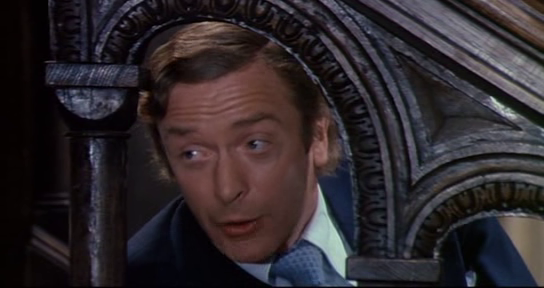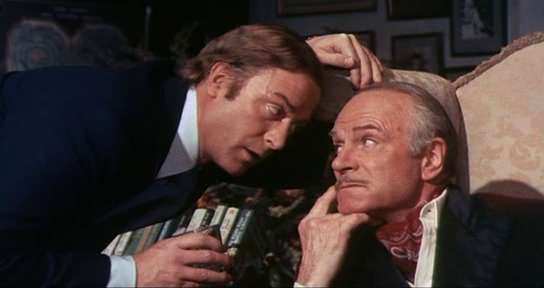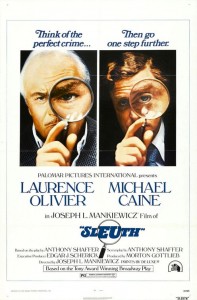|
Genres, Themes, Actors, and Directors:
- Cat-and-Mouse
- Class Relations
- Infidelity
- Joseph L. Mankiewicz Films
- Laurence Olivier Films
- Michael Caine Films
- Play Adaptation
- Writers
Review:
Joseph Mankiewicz’s final film as a director was this adaptation of Anthony Shaffer’s hit Broadway play, about a successful mystery novel writer who revels in the opportunity to utilize the “tools of his trade” as he engages in an increasingly taut game of cat-and-mouse with his wife’s lover. The storyline is full of so many spoilers that, as most reviewers have noted, it’s best not to read too much about the film ahead of time if you want to remain surprised throughout. With that said, I’ll keep this review rather short, simply noting that both Caine and Olivier’s performances are spot-on throughout, and that Mankiewicz’s direction of a decidedly house-bound play is consistently innovative and fresh, with excellent use made of various props around the house. Enjoy!
Note: Not surprisingly, it seems that Shaffer was “partially inspired” by his game-loving friend, Stephen Sondheim, who co-wrote (with Anthony Perkins) the similarly plot-twisty thriller The Last of Sheila (1973).
Redeeming Qualities and Moments:
- Laurence Olivier as Andrew Wyke

- Michael Caine as Milo Tindle

- Fine direction by Mankiewicz

Must See?
Yes, as a most enjoyable thriller.
Categories
(Listed in 1001 Movies You Must See Before You Die)
Links:
|




One thought on “Sleuth (1972)”
Not really a must – tho it may be somewhat entertaining for those who like film versions of very talky stage plays.
Of course, I write plays and quite often appreciate film versions of them but this one doesn’t engage me for various reasons. The good news is that Mankiewicz and DP Oswald Morris (‘Moby Dick’, ‘Lolita’, etc.) have done a commendable job in at least keeping a one-location story visually interesting.
But then there’s the sour-toned script – yes, based on the long-running play that apparently pleased thousands as something of a snob-hit. Not only is it too contrived (and way too consciously clever) for my liking but it’s not all that believable on its own terms. The set-up is excruciatingly long and, like the entire story, is over-written. Olivier’s character has an ultimately annoying habit of suddenly speaking as various fictional mystery characters – which becomes a very tedious tic; we start to think we’re less in the company of his character and held hostage by a theater queen who doesn’t know when the joke is played out. (Shaffer’s twin brother Peter was able to carry off verbal pyrotechnics much more successfully in, for example, a blisteringly witty play like ‘Lettice and Lovage’. Unlike Peter, Anthony did not generally write original material.)
Midway comes a major plot twist executed so badly on-screen that Olivier’s character (being an expert mystery writer) would see right through it in an instant. (Not to mention the audience.)
I much prefer Olivier when he underplays (‘Rebecca’, ‘Bunny Lake is Missing’) because he then gains strength as an actor. Here he’s given full-rein, so is allowed to give vent to his tendency to ham it up. (Though, again, he is saddled with such verbosity that it’s often easy to just tune him out.) Caine does a better job at side-stepping the traps of what he’s asked to play.
A good deal of the joy in the genre that ‘Sleuth’ pays tribute to comes from an economic sense of urgency. By comparison, ‘Sleuth’ takes a leisurely approach which (to me, anyway) is slow as molasses.
(In-joke: fans of ‘All About Eve’ will quickly note that ‘Eve Channing’ is ‘in’ the cast.)